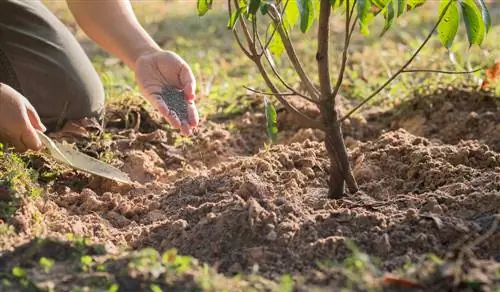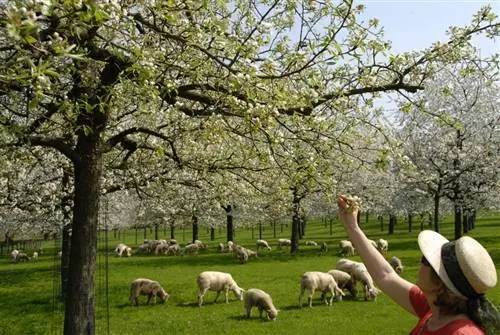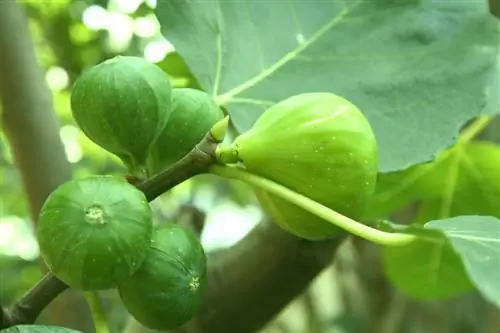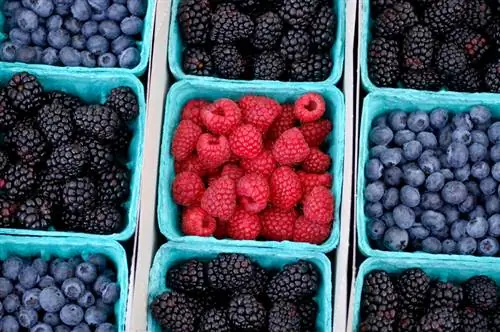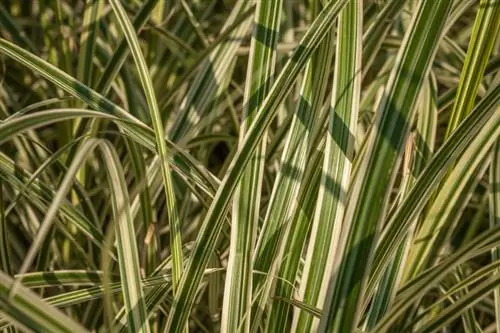- Author admin [email protected].
- Public 2023-12-16 16:46.
- Last modified 2025-06-01 06:02.
Only fruit trees that receive sufficient nutrients bear rich fruit, produce flowers for the coming year and develop strong new shoots. But be careful: fertilization is not always necessary. Garden soils are often over-fertilized with nitrogen, phosphate and potassium, which in turn promotes diseases. In nutrient-rich soil, fruit trees can survive for a more or less long time without fertilization.
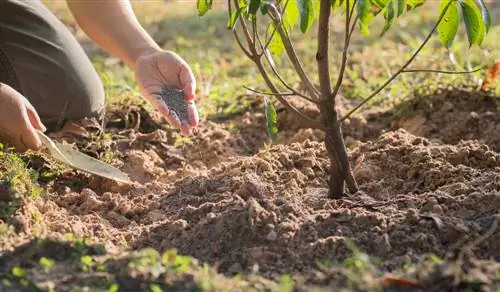
How should fruit trees be properly fertilized?
Fertilize fruit trees correctly: A soil test before planting helps to determine the need for nitrogen, phosphate and potassium. Freshly planted trees benefit from complete fertilizer, while trees in the lawn should be fertilized with liquid fertilizer. Rock dust additionally strengthens plants.
Soil testing provides information about the need for fertilization
Before planting, especially several fruit trees, it makes sense to take a soil sample. These are sent for examination to a state institute (which is often affiliated with the Chamber of Agriculture) or private institute (laboratory for soil and fertilizer testing) and analyzed there. Within two to four weeks you will receive an answer with the analysis results and a fertilizer recommendation based on them. The best time to take soil samples is after harvest in autumn or winter, provided the ground is not frozen. However, under no circumstances should you take the samples after fertilization has already taken place, not even after organic fertilization with compost.
Fertilize fruit trees properly - this is how it works
When fertilizing, you should primarily adhere to the recommendations derived from the soil samples as well as the specific needs of the fruit species and varieties planted. The following recommendations are more of a general guide.
Fertilize berry bushes and fruit trees
Strongly growing fruit trees usually do not require any additional fertilizer to grow and produce fruit, as their extensive, deep root system ensures an adequate supply of water and nutrients. Shallow-rooted fruit trees, on the other hand, can often use additional supply because these roots only penetrate a small part of the soil and do not reach deep. Cover the tree disc with seasoned compost or lightly work complete fertilizer into the soil. Dry soil must be watered so that the fertilizer reaches where it is needed: at the roots.
Support freshly planted fruit trees with fertilization
You can help younger fruit trees on nutrient-poor soils to grow by fertilizing them. For this you should use a complete fertilizer that contains all trace elements. Both organic and mineral fertilizers are suitable. As a plant strengthener, rock flour, which is also commercially available under the name primary rock flour, provides excellent services in the garden.
Properly fertilize fruit trees in the lawn
For fruit trees standing in the lawn, it makes little sense to simply spread the fertilizer: most of it would benefit the grass and not the tree. In this case, fertilize liquid, for example with 100 to 150 grams of blue grain, which you dissolve in 10 liters of water. This fertilizer solution is poured into cracks that you have previously opened in the root area using a digging fork (€31.00 on Amazon).
Tip
Fruit trees cultivated in containers are either supplied with a slow-release fertilizer in spring or fertilized with a liquid fruit tree fertilizer every two to three weeks during the main growing season (but at least until the end of June).

